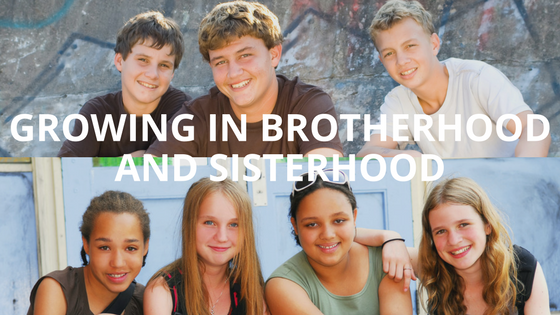
“I have 30 teens who want to be in small groups. How do I assign the groups? What if they don’t gel?”
If I had a dime for every time I heard this question, I’d be a rich woman. Ok, maybe not rich, but I’d be able to take you out to Chick-Fil-A for sure.
I struggled with this same question myself. For years as a parish minister, I would create small groups by assigning them randomly, usually by grade, sometimes even intentionally breaking up groups of friends. At the same time, I also struggled with a tension of two truths:
- Small groups and the dialogue they afford are absolutely indispensable to ministry.
- With a few notable exceptions, the real-life experience of small groups was forced at best, and at times was downright painful.
Then a mentor challenged me:
Mentor: Do you like to talk about Jesus, the Church, your relationship with God?
Me: Umm, yeah. I’m a youth minister.
Mentor: If someone you didn’t know and had no reason to trust put you in a small group of your peers without you having any say, how easy would it be for you to talk about those things?

Me: Tough. But I could get there. I’m a youth minister.
Mentor: How easy would it be for you to be vulnerable with those people?
Me: I wouldn’t. Vulnerability is hard enough with people I know and trust.
Mentor: Then why would you expect teenagers who may not like talking about God to be open in a group of people they don’t know?
Creating Small Groups with Affinity
Through my training in YDisciple, I discovered the solution to this tension I was experiencing. I was challenged to let go of a little control (a painful concept for someone like me) and “leverage natural relationships.” Another word for these natural relationships is affinity.
When a parent or teen expressed interest in being in a discipleship group, I or the parents would ask them, “If you could have any other guys/girls in your group, who would you ask?” Then we reached out to those families. Not only did this create groups that already got along, it gave the teens a sense of ownership to have been directly a part of the process. The thing that surprised me most about using this method was that teens and families were identifying other teens who I didn’t know or who had become disengaged. These families would likely have deleted my email before even opening it, but were less likely to ignore a friend’s request.
Other parishes that use this “affinity method” ask teens to write down a friend that they want in their group, and the parish leaders keep these requests in mind while assigning the groups. This version of the method shows the teens that the adults value and respect their wishes, but affords the parish leaders license to make strategic decisions about group members when necessary.
When we work with these natural relationships, rather than ignoring or working against them, the tension I described earlier all but disappears. Openness already exists with friends. You don’t have to worry about them gelling, because that work was done long before you formed a discipleship group.
Now, I’m not saying you should take a laissez faire attitude to your youth ministry. Some situations call for a group of friends that is disruptive to be separated. Leveraging affinity to create small groups does not require you to let go of all control, rather it helps you recognize that you can share it.






